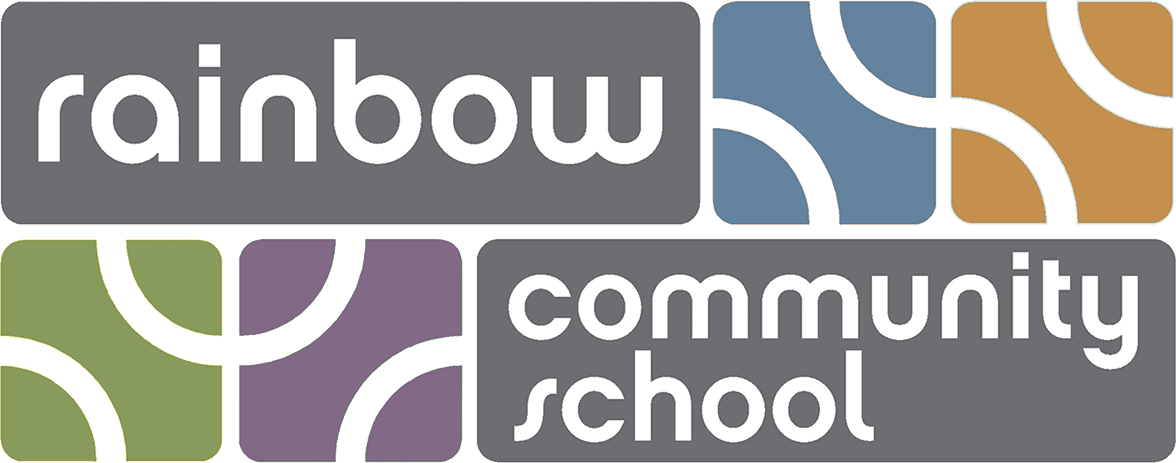12 Guiding Principles of Rainbow Community School’s Educational Model
1. Holistic Learning
Each child is unique and learns differently. The child is a whole human being; therefore, a complete education develops the child in all seven domains: spiritual, mental, social, natural, emotional, creative, and physical.
2. Harmonious Learning Environment
Children learn best in an environment that is physically and emotionally safe. Love and respect underlay each teacher’s approach to skillful classroom management. The more students are engaged and on-task, the more they learn: We provide a secure learning environment by giving students the daily structure they need to feel grounded, with the flexibility to drive inspiration.
3. Creativity and Critical Thinking
Immersion in the arts expands the soul. Developing imagination also builds critical thinking skills. While there is a place for memorization and rote skill building, critical thinking is the foundation for building the future. Therefore, time for students to build hypotheses, observe, and evaluate fosters curiosity and problem-solving. Furthermore, children learn decision-making and leadership skills by exercising a voice in the classroom.
4. The Natural World and Sustainability
Through understanding nature, we understand ourselves. Therefore, the learning environment extends into the natural world and into the greater community, and children spend as much time outside as possible. Children who have a relationship with nature will take care of it.
5. Authentic Learning
The curriculum, based on thematic interdisciplinary learning, creates relevant connections for students. We inspire and empower through discovery, using experiential learning, inquiry learning, and real-world opportunities. In order to build confidence, students take risks and meet increasingly difficult challenges. Learning from failure teaches problem-solving and perseverance.
6. Research and Innovation
Our pedagogy adapts and evolves according to the current, applicable research and our own rich experience and innovation. We are free to borrow best-practices from great learning models such as Waldorf, Montessori, and others, to create a hybrid model that adapts to contemporary needs, brain research, and practicality.
7. A Balanced Approach to Learning and Assessment
Fostering a love of learning is the key to creating motivated learners. Our curriculum is designed to introduce skills at key developmental windows (while allowing flexibility for differences among individual children) and inspiring children to challenge themselves. Students are assessed using multi-faceted methods to create a well-rounded understanding of both the level each child is at and what type of learner each is.
8. Contemplation, Compassion, and Service
Contemplative methods support all aspects of development. Morning centering is a key time of day to help students focus and grow their inner life. We explore the world’s religious traditions for spiritual insight, as we develop a higher consciousness. We build character and compassion through service to the larger community. The development of values is the most important lesson.
9. Meaningful Relationships
The relationship between the teacher and the student is the heart of education. Collaboration between students fosters ideas and social skills. Students become adept communicators. A parent is a child’s first teacher, and we will honor you and communicate with you as such while supporting your growth as a parent.
10. Health and Wholeness
Healthy habits, in and out of the classroom, help children learn and grow into healthy adults. Physical education and kinesthetic learning are integrated into the curriculum. A safe learning environment builds confidence. Balance in all aspects of life brings contentment.
11. Community and Individuality
A strong community is diverse, supportive, and cooperative. Within our strong community, each child is treated as an individual. Their unique interests, talents, and learning styles are nurtured. Social and emotional learning builds competent world citizens.
12. Gifted Teachers
The most important component to our program is gifted teachers. Our teachers are trained in the best conventional practices (most with a Masters Degree in Education) and alternative, holistic practices, in order to provide a balanced approach to teaching. Educators must be excellent role models and passionate about life. Education is a sacred calling: Our goal is to make a positive difference in the life of your child, our community, and beyond.

